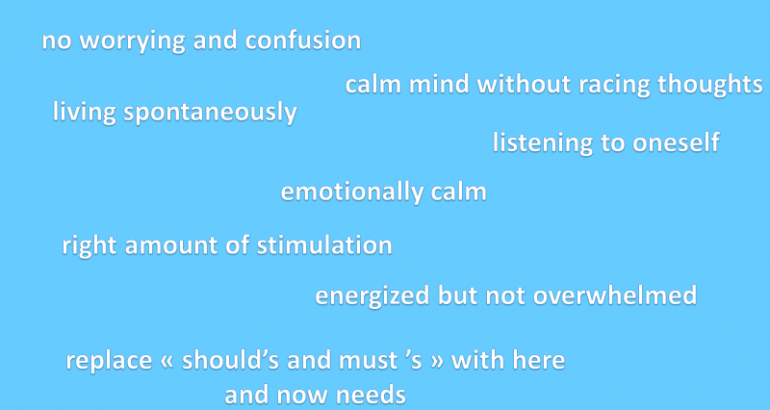Let’s do the reverse approach and ask ourselves how our days and life would look like without anxiety?
* We would feel emotionally calm and at peace with ourselves—no worrying about past events or future potential negative outcomes, no opposing or racing thoughts, no confusion or difficulty with concentration. Our bodies would not call for our attention with fast breathing, tightened chest, turbulent stomach, accelerated heartbeat and general body tension.
* Our life would contain the right amount of stimulation and challenge; having too much leads to stress and anxiety and not having enough makes us feel bored and apathic.
* We would live spontaneously, deciding from moment to moment what we need, instead of following previously made plans or being obliged to execute the internal “I must and should do sth.” voice.
* Lastly, we would be in touch with ourselves and have awareness of what is happening inside us. Which events and relations impact me and how? Not knowing what we feel or suppressing our own emotions can be an important source of anxiety.

The sources of the anxiety
There are individual differences in how we perceive, interpret and respond to stressful situations; what is a trigger for one person might produce a neutral response in another person.
If your anxiety is caused by an external source, that means that something happened between you and the environment that evoked your anxiety. If it is from an internal source, on the other hand, that means that the anxiety is aroused through internal thought processes. What you think impacts how you feel and conversely, your prior feelings influence which thoughts will arise. Thinking and feeling are inherently linked and impact each other.
Likewise, external and internal sources often merge and amplify the anxiety: you experienced something painful or distressing in the here and now and your mind will thereafter associate it with other emotionally related events. You are thus not only stressed about your current situation but also by previous ones.
Reducing the impacts of the anxiety
1. Understand and modify the mind’s functioning
The mind is on one hand a useful engine that enables daily, routine operations to run smoothly, yet, it can become unproductive and run uncontrollably, producing disordering thoughts which cause anxiety and distress. Therefore, we need to get back the control over our mind if we want to tame the anxiety. But how?
1.1. Think consciously and open the restricted view of the reality
Automatic thought production is a natural process of the mind. But because of this reflex, many disturbing, anxiety provoking and distorted thoughts get produced without our awareness. The solution lies in our capacity to intervene and observe our automatically generated thoughts: What is the theme of your thoughts when you feel anxious? Do you experience similar thoughts regularly?
For instance, you are anxious when people behave in a certain way towards you and your automatic thought in these situations is that you are not respected. To be able to identify these thoughts is critical, since it can lead to and inform you about your beliefs (which were formed at some point in your past) and they are, without you being aware, still determining your perceptions and interpretations. The problem is that your pattern of feeling and responding is distorted and it filters out all that doesn’t fit your beliefs. So, you repeatedly see that people don’t respect you, even when in fact they do.
Can you thus link your automatic thoughts with the underlying beliefs which can be the source of the anxiety? Start opening your restricted view of the situation and consciously intervene in your interpretations. Detach from your subjective experience and become an objective observer of your mind’s functioning. Ask yourself: Is my reasoning objective? What could be other possible explanations of this situation? Have I overlooked something in the big picture? Am I narrowing my view by neglecting the positive aspects of the situation? Am I taking things too personally when actually the conduct of the other person reflects just his / her own problems and behavioral patterns?
1.2. Detach and don’t take your thoughts seriously
A second approach to dealing with anxiety is to learn to disengage yourself from the thoughts and see them as the product of the mind, as something that exists, but does not necessarily represent the true reality. To keep yourself out of the grip of anxiety, you should have the power to not get pulled inside the mental buzz but rather stay outside of it. Help your mind to be less influencing and more in the background; it is you who decides which thoughts you will consider and which you will ignore. Detach, observe and let go of your thoughts; your mental landscape will feel spacious and serene and your anxiety will decline.
2. Discharge the emotions
Unreleased emotions breed anxiety, so finding ways to access and release them would be another pathway to reduce the anxiety. I will be writing about the emotions in my upcoming blog, but for now I can just say that your attitude towards your feelings is determining. Being non-judgmental, accepting, and self-empathic is the nurturing attitude that invites and welcomes your emotions to be experienced and paves the way for reducing your anxiety.
3. Find the optimum level of stimulation
I have realized that people’s opinions on whether they have an optimal level of stimulation is not objective. The reason is that we have grown to be accustomed to a certain life-style with a certain number of activities and obligations, so we never question if our level of stimulation is optimal, under or over-challenging. We are forced to moderate our level of activities and obligations once we are run down by strong anxiety, exhaustion or burn out, but why wait until that point?
So, what is your optimum level of stimulation? A simple answer would be, it is when you feel activated but not overwhelmed. You feel in equilibrium, energized, in control of your responses and psycho-physiological states, refreshed after rest and driven to tackle daily tasks. When you have more on your plate than would be good for you, your internal equilibrium is ruptured; you often feel tired, stressed or irritable and you manage to keep your head above water, while waiting for the week end or next holiday. Finally, your level of stimulation is insufficient when you feel apathic, disconnected, low on energy, without a real motivation and interest for anything.
It happens frequently that after reaching a peak of over-stimulation, exhaustion ensues and throws us directly into an apathic and under-stimulated state. Finding internal equilibrium and an optimum level of stimulation will have beneficial effects, promoting a more modest level of anxiety that can be easily regulated and kept in check. To attain it, we might need to revamp our lives and call into question our lifestyle, daily habits, relations with others and self-defeating beliefs.
4. Connect with your body emotions to recognize what you need
Living mainly in our “heads” implies that we might be disconnected from our body and emotions, though they are the very source of valuable information. They inform us about our physiological and emotional state and can thus indicate whether we are experiencing anxiety.
Ask yourself: Do I feel anxious, stressed, or edgy? Is my body tight? Do I feel I need to rush to achieve all that I planned? Etc. Subsequently, you can take proper actions to modulate anxiety and regain your internal equilibrium and well-being. Perhaps you need to reduce your obligations for today and just unwind, temporarily withdraw a bit from contacts, relax your body and mind, etc. Discern your state and do what you feel you need to do to feel better and reduce your anxiety and stress. All the answers lie within you, but to access them, you need to get in touch with yourself daily and verify. Only then can you respond best to the changing nature of your inner needs and adapt your plans accordingly. To make it happen, you need to stop following plans too rigidly, obeying the “shoulds and musts” in your mind and so make spontaneity and freedom to modify your commitments and follow your needs, a priority and a daily guideline.
REVIEW
Reducing the impacts of the anxiety:
1. Influence your mind’s functioning
1.1 Think consciously and open the restricted view of reality
1.2. Detach and don’t take the thoughts seriously
2. Discharge the emotions
3. Find the optimum level of stimulation
4. Connect with your body and emotions to recognize what you need

